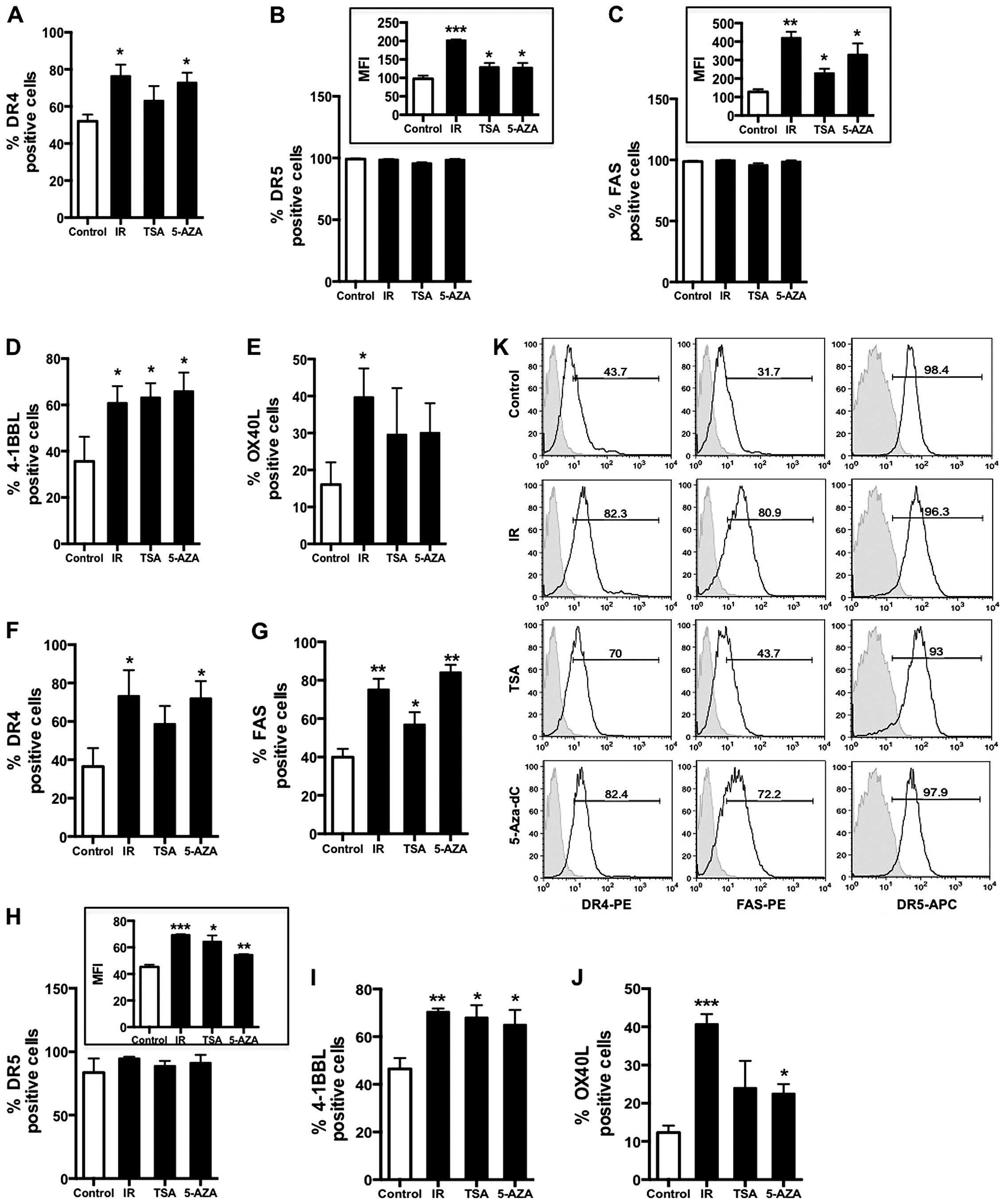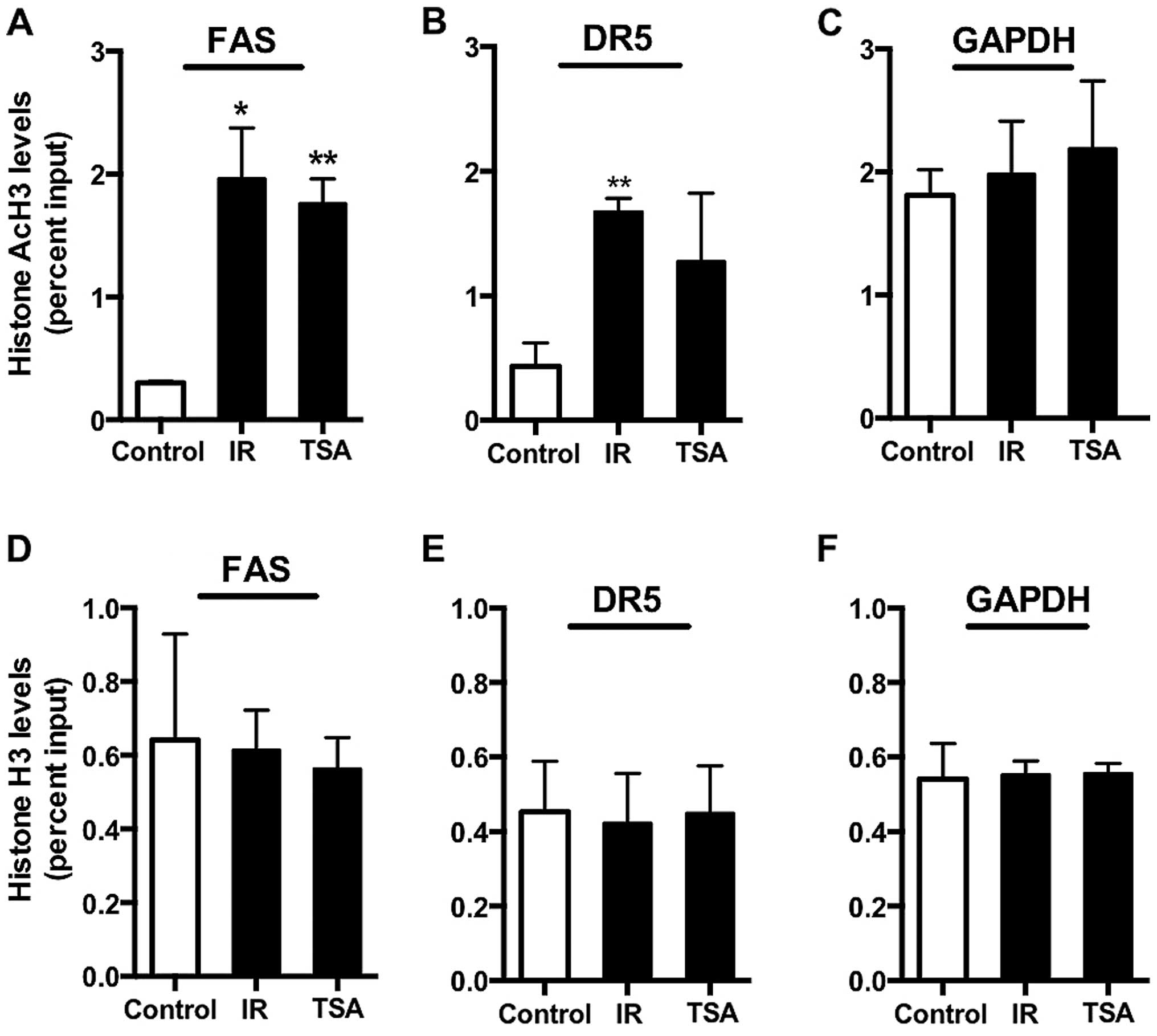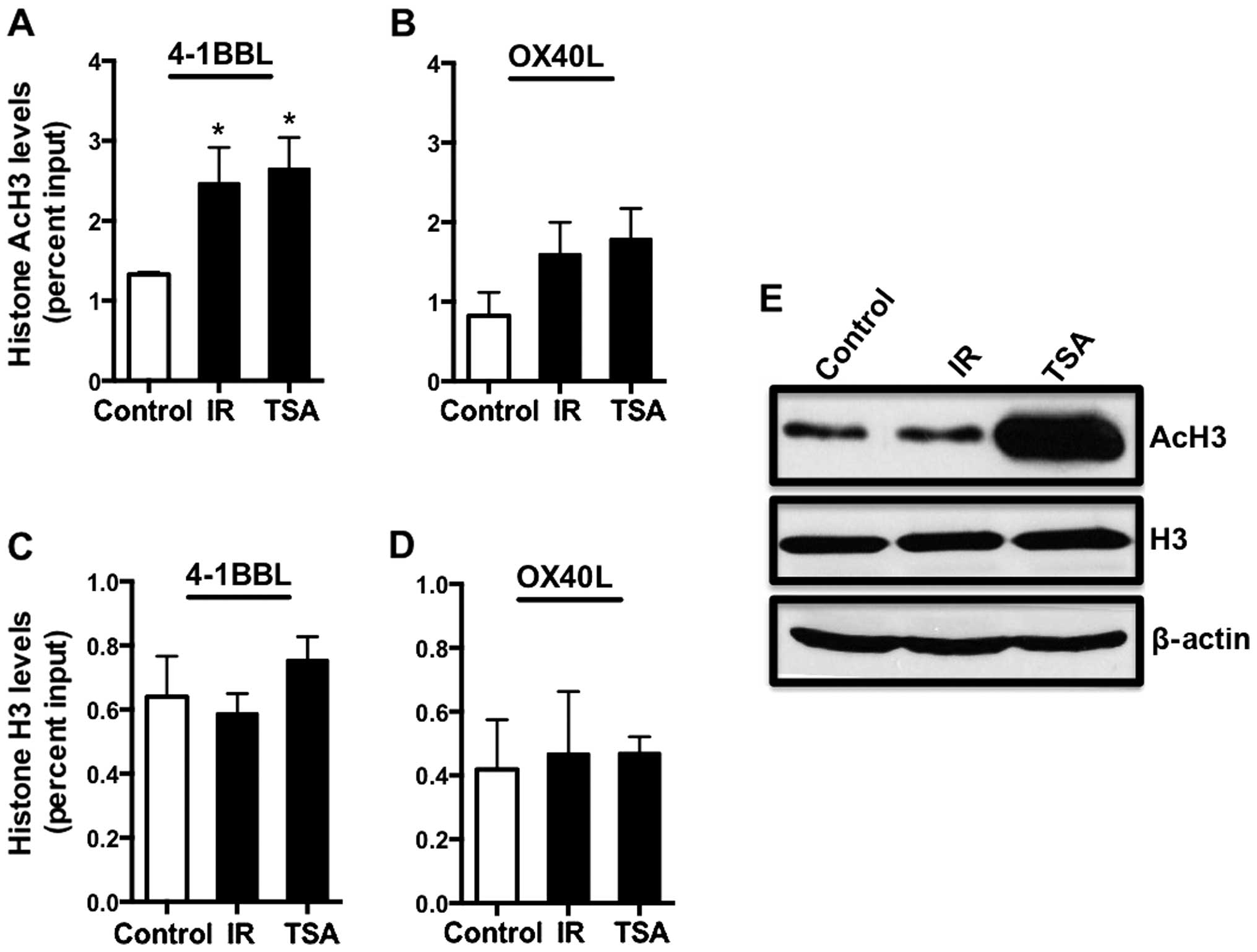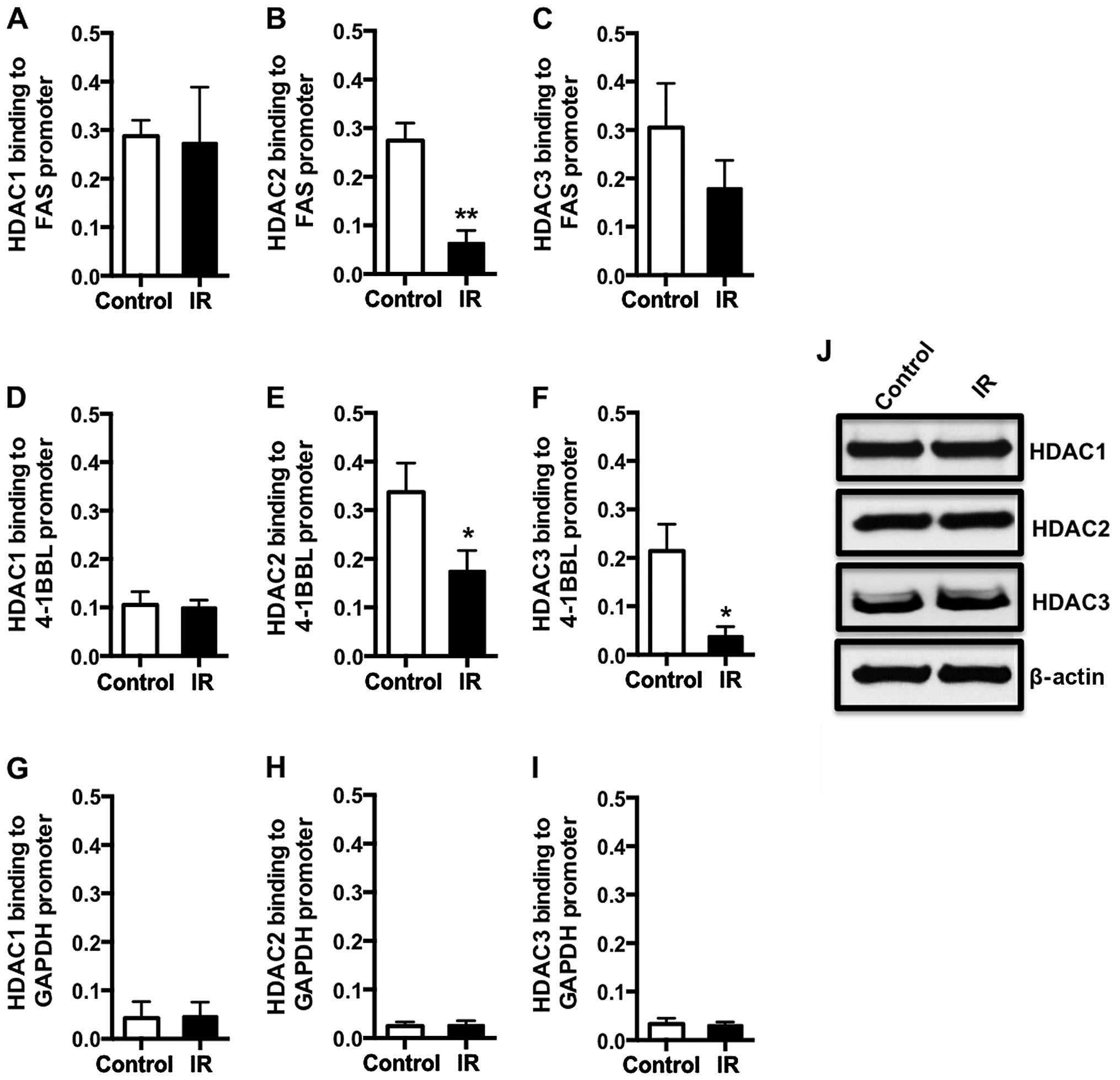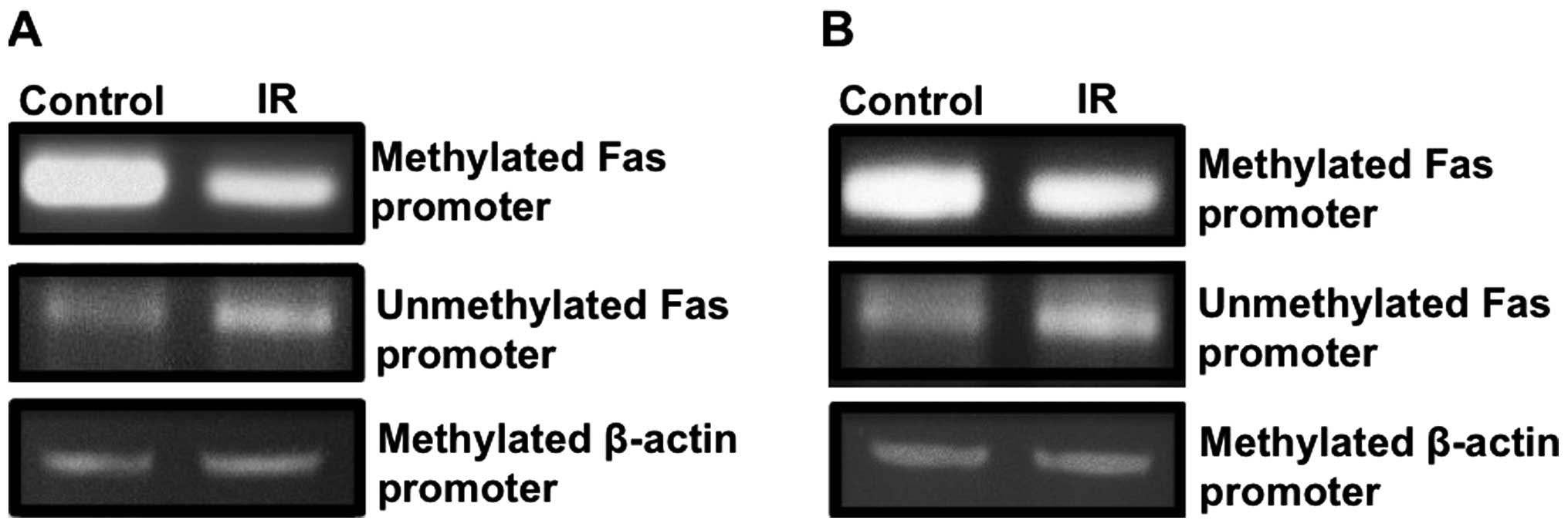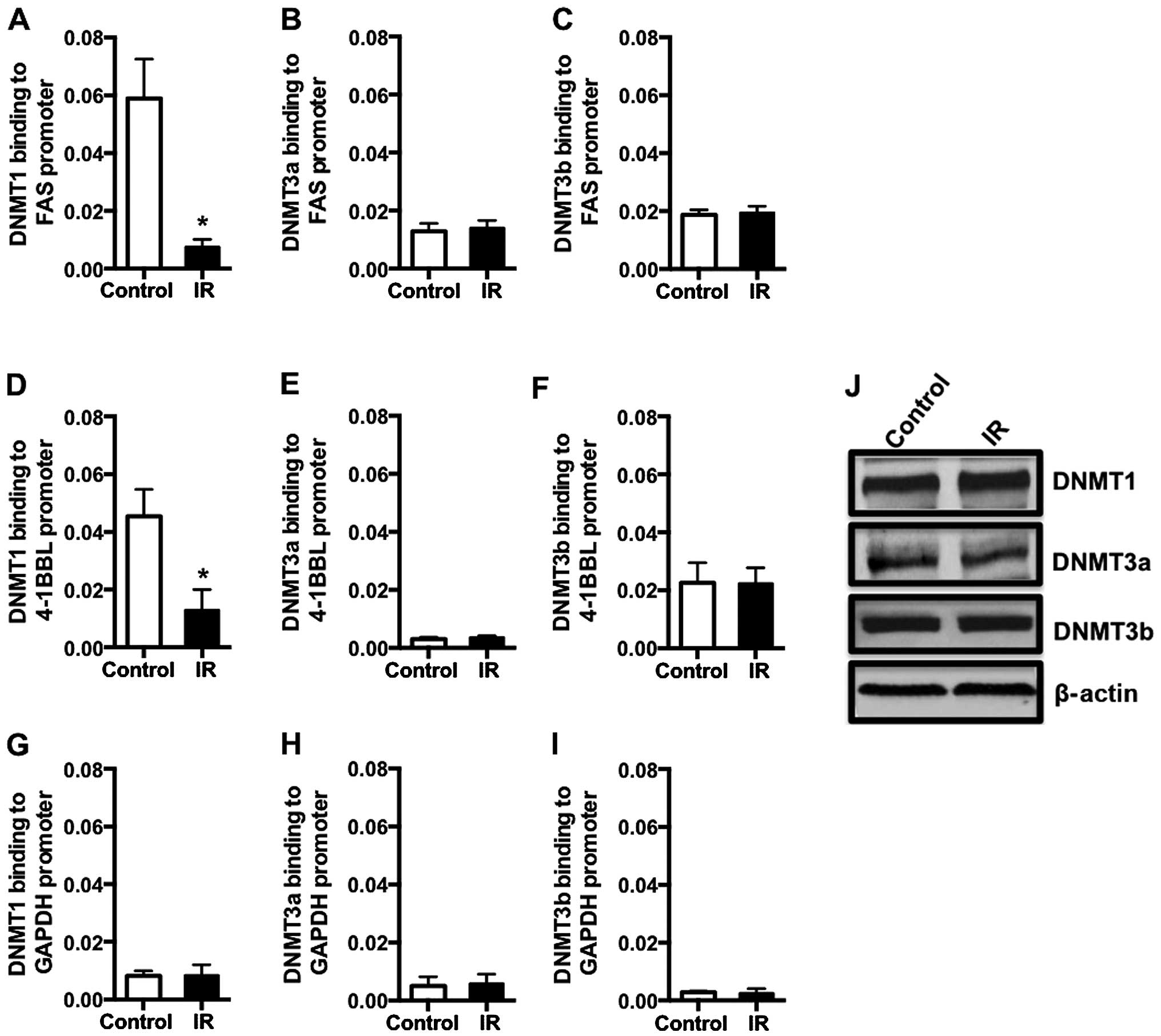|
1
|
Szumiel I: Ionising radiation-induced
oxidative stress, epigenetic changes and genomic instability: The
pivotal role of mitochondria. Int J Radiat Biol. 91:1–12. 2015.
View Article : Google Scholar
|
|
2
|
Agassi AM, Myslicki FA, Shulman JM,
Rotterman Y, Dosoretz DE, Fernandez E, Mantz CA and Finkelstein SE:
The promise of combining radiation therapy and immunotherapy:
Morbidity and toxicity. Future Oncol. 10:2319–2328. 2014.
View Article : Google Scholar : PubMed/NCBI
|
|
3
|
Finkelstein SE, Salenius S, Mantz CA,
Shore ND, Fernandez EB, Shulman J, Myslicki FA, Agassi AM,
Rotterman Y, DeVries T, et al: Combining immunotherapy and
radiation for prostate cancer. Clin Genitourin Cancer. 13:1–9.
2015. View Article : Google Scholar
|
|
4
|
Garnett-Benson C, Hodge JW and Gameiro SR:
Combination regimens of radiation therapy and therapeutic cancer
vaccines: Mechanisms and opportunities. Semin Radiat Oncol.
25:46–53. 2015. View Article : Google Scholar
|
|
5
|
Di Leonardo A, Linke SP, Clarkin K and
Wahl GM: DNA damage triggers a prolonged p53-dependent G1 arrest
and long-term induction of Cip1 in normal human fibroblasts. Genes
Dev. 8:2540–2551. 1994. View Article : Google Scholar : PubMed/NCBI
|
|
6
|
d'Adda di Fagagna F, Reaper PM,
Clay-Farrace L, Fiegler H, Carr P, Von Zglinicki T, Saretzki G,
Carter NP and Jackson SP: A DNA damage checkpoint response in
telomere-initiated senescence. Nature. 426:194–198. 2003.
View Article : Google Scholar : PubMed/NCBI
|
|
7
|
Ostling O and Johanson KJ:
Microelectrophoretic study of radiation-induced DNA damages in
individual mammalian cells. Biochem Biophys Res Commun.
123:291–298. 1984. View Article : Google Scholar : PubMed/NCBI
|
|
8
|
Tusher VG, Tibshirani R and Chu G:
Significance analysis of microarrays applied to the ionizing
radiation response. Proc Natl Acad Sci USA. 98:5116–5121. 2001.
View Article : Google Scholar : PubMed/NCBI
|
|
9
|
Kumari A, Cacan E, Greer SF and
Garnett-Benson C: Turning T cells on: Epigenetically enhanced
expression of effector T-cell costimulatory molecules on irradiated
human tumor cells. J Immunother Cancer. 1:172013. View Article : Google Scholar : PubMed/NCBI
|
|
10
|
Ifeadi V and Garnett-Benson C: Sublethal
irradiation of human colorectal tumor cells imparts enhanced and
sustained susceptibility to multiple death receptor signaling
pathways. PLoS One. 7:e317622012. View Article : Google Scholar
|
|
11
|
Gameiro SR, Jammeh ML, Wattenberg MM,
Tsang KY, Ferrone S and Hodge JW: Radiation-induced immunogenic
modulation of tumor enhances antigen processing and calreticulin
exposure, resulting in enhanced T-cell killing. Oncotarget.
5:403–416. 2014. View Article : Google Scholar : PubMed/NCBI
|
|
12
|
Garnett CT, Palena C, Chakraborty M, Tsang
KY, Schlom J and Hodge JW: Sublethal irradiation of human tumor
cells modulates phenotype resulting in enhanced killing by
cytotoxic T lymphocytes. Cancer Res. 64:7985–7994. 2004. View Article : Google Scholar : PubMed/NCBI
|
|
13
|
Kim R, Emi M and Tanabe K: Cancer
immunoediting from immune surveillance to immune escape.
Immunology. 121:1–14. 2007. View Article : Google Scholar : PubMed/NCBI
|
|
14
|
Bubeník J: MHC class I down-regulation:
Tumour escape from immune surveillance (Review)? Int J Oncol.
25:487–491. 2004.
|
|
15
|
Lee H, Kim JH, Yang SY, Kong J, Oh M,
Jeong DH, Chung JI, Bae KB, Shin JY, Hong KH, et al: Peripheral
blood gene expression of B7 and CD28 family members associated with
tumor progression and microscopic lymphovascular invasion in colon
cancer patients. J Cancer Res Clin Oncol. 136:1445–1452. 2010.
View Article : Google Scholar : PubMed/NCBI
|
|
16
|
French LE and Tschopp J: Defective death
receptor signaling as a cause of tumor immune escape. Semin Cancer
Biol. 12:51–55. 2002. View Article : Google Scholar : PubMed/NCBI
|
|
17
|
Hopkins-Donaldson S, Ziegler A, Kurtz S,
Bigosch C, Kandioler D, Ludwig C, Zangemeister-Wittke U and Stahel
R: Silencing of death receptor and caspase-8 expression in small
cell lung carcinoma cell lines and tumors by DNA methylation. Cell
Death Differ. 10:356–364. 2003. View Article : Google Scholar : PubMed/NCBI
|
|
18
|
Croft M, So T, Duan W and Soroosh P: The
significance of OX40 and OX40L to T-cell biology and immune
disease. Immunol Rev. 229:173–191. 2009. View Article : Google Scholar : PubMed/NCBI
|
|
19
|
Tu TH, Kim CS, Nam-Goong IS, Nam CW, Kim
YI, Goto T, Kawada T, Park T, Yoon Park JH, Ryoo ZY, et al: 4-1BBL
signaling promotes cell proliferation through reprogramming of
glucose metabolism in monocytes/macrophages. FEBS J. 282:1468–1480.
2015. View Article : Google Scholar : PubMed/NCBI
|
|
20
|
Eun SY, Lee SW, Xu Y and Croft M: 4-1BB
ligand signaling to T cells limits T cell activation. J Immunol.
194:134–141. 2015. View Article : Google Scholar
|
|
21
|
Guicciardi ME and Gores GJ: Life and death
by death receptors. FASEB J. 23:1625–1637. 2009. View Article : Google Scholar : PubMed/NCBI
|
|
22
|
Koornstra JJ, Kleibeuker JH, van Geelen
CM, Rijcken FE, Hollema H, de Vries EG and de Jong S: Expression of
TRAIL (TNF-related apoptosis-inducing ligand) and its receptors in
normal colonic mucosa, adenomas, and carcinomas. J Pathol.
200:327–335. 2003. View Article : Google Scholar : PubMed/NCBI
|
|
23
|
Driscoll PC: Structural studies of death
receptors. Methods Enzymol. 545:201–242. 2014. View Article : Google Scholar : PubMed/NCBI
|
|
24
|
Gronbaek K, Hother C and Jones PA:
Epigenetic changes in cancer. APMIS. 115:1039–1059. 2007.
View Article : Google Scholar : PubMed/NCBI
|
|
25
|
Jin B, Yao B, Li JL, Fields CR, Delmas AL,
Liu C and Robertson KD: DNMT1 and DNMT3B modulate distinct
polycomb-mediated histone modifications in colon cancer. Cancer
Res. 69:7412–7421. 2009. View Article : Google Scholar : PubMed/NCBI
|
|
26
|
Müller BM, Jana L, Kasajima A, Lehmann A,
Prinzler J, Budczies J, Winzer KJ, Dietel M, Weichert W and Denkert
C: Differential expression of histone deacetylases HDAC1, 2 and 3
in human breast cancer--overexpression of HDAC2 and HDAC3 is
associated with clinicopathological indicators of disease
progression. BMC Cancer. 13:2152013. View Article : Google Scholar : PubMed/NCBI
|
|
27
|
Herman JG and Baylin SB: Gene silencing in
cancer in association with promoter hypermethylation. N Engl J Med.
349:2042–2054. 2003. View Article : Google Scholar : PubMed/NCBI
|
|
28
|
Esteller M: Cancer epigenomics: DNA
methylomes and histone-modification maps. Nat Rev Genet. 8:286–298.
2007. View
Article : Google Scholar : PubMed/NCBI
|
|
29
|
Nguyen CT, Gonzales FA and Jones PA:
Altered chromatin structure associated with methylation-induced
gene silencing in cancer cells: Correlation of accessibility,
methylation, MeCP2 binding and acetylation. Nucleic Acids Res.
29:4598–4606. 2001. View Article : Google Scholar : PubMed/NCBI
|
|
30
|
Cacan E, Ali MW, Boyd NH, Hooks SB and
Greer SF: Inhibition of HDAC1 and DNMT1 modulate RGS10 expression
and decrease ovarian cancer chemoresistance. PLoS One.
9:e874552014. View Article : Google Scholar : PubMed/NCBI
|
|
31
|
Ali MW, Cacan E, Liu Y, Pierce JY,
Creasman WT, Murph MM, Govindarajan R, Eblen ST, Greer SF and Hooks
SB: Transcriptional suppression, DNA methylation, and histone
deacetylation of the regulator of G-protein signaling 10 (RGS10)
gene in ovarian cancer cells. PLoS One. 8:e601852013. View Article : Google Scholar : PubMed/NCBI
|
|
32
|
Ramakrishnan V: Histone structure and the
organization of the nucleosome. Annu Rev Biophys Biomol Struct.
26:83–112. 1997. View Article : Google Scholar : PubMed/NCBI
|
|
33
|
Kouzarides T: Chromatin modifications and
their function. Cell. 128:693–705. 2007. View Article : Google Scholar : PubMed/NCBI
|
|
34
|
Kuo MH and Allis CD: Roles of histone
acetyltransferases and deacetylases in gene regulation. BioEssays.
20:615–626. 1998. View Article : Google Scholar : PubMed/NCBI
|
|
35
|
Stypula-Cyrus Y, Damania D, Kunte DP, Cruz
MD, Subramanian H, Roy HK and Backman V: HDAC up-regulation in
early colon field carcinogenesis is involved in cell tumorigenicity
through regulation of chromatin structure. PLoS One. 8:e646002013.
View Article : Google Scholar : PubMed/NCBI
|
|
36
|
Millard CJ, Watson PJ, Celardo I,
Gordiyenko Y, Cowley SM, Robinson CV, Fairall L and Schwabe JW:
Class I HDACs share a common mechanism of regulation by inositol
phosphates. Mol Cell. 51:57–67. 2013. View Article : Google Scholar : PubMed/NCBI
|
|
37
|
Esteller M: CpG island hypermethylation
and tumor suppressor genes: A booming present, a brighter future.
Oncogene. 21:5427–5440. 2002. View Article : Google Scholar : PubMed/NCBI
|
|
38
|
Rhee I, Jair KW, Yen RW, Lengauer C,
Herman JG, Kinzler KW, Vogelstein B, Baylin SB and Schuebel KE: CpG
methylation is maintained in human cancer cells lacking DNMT1.
Nature. 404:1003–1007. 2000. View Article : Google Scholar : PubMed/NCBI
|
|
39
|
Jin B, Li Y and Robertson KD: DNA
methylation: Superior or subordinate in the epigenetic hierarchy?
Genes Cancer. 2:607–617. 2011. View Article : Google Scholar : PubMed/NCBI
|
|
40
|
Venza M, Visalli M, Catalano T, Fortunato
C, Oteri R, Teti D and Venza I: Impact of DNA methyltransferases on
the epigenetic regulation of tumor necrosis factor-related
apoptosis-inducing ligand (TRAIL) receptor expression in malignant
melanoma. Biochem Biophys Res Commun. 441:743–750. 2013. View Article : Google Scholar : PubMed/NCBI
|
|
41
|
Maecker HL, Yun Z, Maecker HT and Giaccia
AJ: Epigenetic changes in tumor Fas levels determine immune escape
and response to therapy. Cancer Cell. 2:139–148. 2002. View Article : Google Scholar : PubMed/NCBI
|
|
42
|
Jazirehi AR and Arle D: Epigenetic
regulation of the TRAIL/ Apo2L apoptotic pathway by histone
deacetylase inhibitors: An attractive approach to bypass melanoma
immunotherapy resistance. Am J Clin Exp Immunol. 2:55–74. 2013.
|
|
43
|
Mueller S, Yang X, Sottero TL, Gragg A,
Prasad G, Polley MY, Weiss WA, Matthay KK, Davidoff AM, DuBois SG,
et al: Cooperation of the HDAC inhibitor vorinostat and radiation
in metastatic neuroblastoma: Efficacy and underlying mechanisms.
Cancer Lett. 306:223–229. 2011. View Article : Google Scholar : PubMed/NCBI
|
|
44
|
Antwih DA, Gabbara KM, Lancaster WD, Ruden
DM and Zielske SP: Radiation-induced epigenetic DNA methylation
modification of radiation-response pathways. Epigenetics.
8:839–848. 2013. View Article : Google Scholar : PubMed/NCBI
|
|
45
|
Kaeser MD, Pebernard S and Iggo RD:
Regulation of p53 stability and function in HCT116 colon cancer
cells. J Biol Chem. 279:7598–7605. 2004. View Article : Google Scholar
|
|
46
|
Rodrigues NR, Rowan A, Smith ME, Kerr IB,
Bodmer WF, Gannon JV and Lane DP: p53 mutations in colorectal
cancer. Proc Natl Acad Sci USA. 87:7555–7559. 1990. View Article : Google Scholar : PubMed/NCBI
|
|
47
|
Aguilera DG, Das CM, Sinnappah-Kang ND,
Joyce C, Taylor PH, Wen S, Hasselblatt M, Paulus W, Fuller G, Wolff
JE, et al: Reactivation of death receptor 4 (DR4) expression
sensitizes medulloblastoma cell lines to TRAIL. J Neurooncol.
93:303–318. 2009. View Article : Google Scholar : PubMed/NCBI
|
|
48
|
Watson CJ, O'Kane H, Maxwell P, Sharaf O,
Petak I, Hyland PL, O'Rouke D, McKnight J, Canning P and Williamson
K: Identification of a methylation hotspot in the death receptor
Fas/ CD95 in bladder cancer. Int J Oncol. 40:645–654. 2012.
|
|
49
|
Bae JH, Kim JG, Heo K, Yang K, Kim TO and
Yi JM: Identification of radiation-induced aberrant hypomethylation
in colon cancer. BMC Genomics. 16:562015. View Article : Google Scholar : PubMed/NCBI
|
|
50
|
Johnstone RW: Histone-deacetylase
inhibitors: Novel drugs for the treatment of cancer. Nat Rev Drug
Discov. 1:287–299. 2002. View
Article : Google Scholar : PubMed/NCBI
|
|
51
|
Takai N, Desmond JC, Kumagai T, Gui D,
Said JW, Whittaker S, Miyakawa I and Koeffler HP: Histone
deacetylase inhibitors have a profound antigrowth activity in
endometrial cancer cells. Clin Cancer Res. 10:1141–1149. 2004.
View Article : Google Scholar : PubMed/NCBI
|
|
52
|
Lyko F and Brown R: DNA methyltransferase
inhibitors and the development of epigenetic cancer therapies. J
Natl Cancer Inst. 97:1498–1506. 2005. View Article : Google Scholar : PubMed/NCBI
|
|
53
|
Yu Y, Teng Y, Liu H, Reed SH and Waters R:
UV irradiation stimulates histone acetylation and chromatin
remodeling at a repressed yeast locus. Proc Natl Acad Sci USA.
102:8650–8655. 2005. View Article : Google Scholar : PubMed/NCBI
|
|
54
|
Pollack BP, Sapkota B and Boss JM:
Ultraviolet radiation-induced transcription is associated with
gene-specific histone acetylation. Photochem Photobiol. 85:652–662.
2009. View Article : Google Scholar
|
|
55
|
Ji S, Tian Y, Lu Y, Sun R, Ji J, Zhang L
and Duan S: Irradiation-induced hippocampal neurogenesis impairment
is associated with epigenetic regulation of bdnf gene
transcription. Brain Res. 1577:77–88. 2014. View Article : Google Scholar : PubMed/NCBI
|
|
56
|
Zimmerman MA, Singh N, Martin PM,
Thangaraju M, Ganapathy V, Waller JL, Shi H, Robertson KD, Munn DH
and Liu K: Butyrate suppresses colonic inflammation through
HDAC1-dependent Fas upregulation and Fas-mediated apoptosis of T
cells. Am J Physiol Gastrointest Liver Physiol. 302:G1405–G1415.
2012. View Article : Google Scholar : PubMed/NCBI
|
|
57
|
Suzuki H, Gabrielson E, Chen W, Anbazhagan
R, van Engeland M, Weijenberg MP, Herman JG and Baylin SB: A
genomic screen for genes upregulated by demethylation and histone
deacetylase inhibition in human colorectal cancer. Nature genetics.
31:141–149. 2002. View
Article : Google Scholar : PubMed/NCBI
|
|
58
|
Thaler R, Spitzer S, Karlic H, Berger C,
Klaushofer K and Varga F: Ibandronate increases the expression of
the pro-apoptotic gene FAS by epigenetic mechanisms in tumor cells.
Biochem Pharmacol. 85:173–185. 2013. View Article : Google Scholar :
|
|
59
|
Li W, Xia D, Wang Y, Li Y, Xue Y, Wu X and
Ye Z: Relationship between aberrant methylation of FAS promoter and
biological behavior of bladder urothelial carcinoma. J Huazhong
Univ Sci Technol Med Sci. 31:794–798. 2011. View Article : Google Scholar : PubMed/NCBI
|
|
60
|
Kurita S, Higuchi H, Saito Y, Nakamoto N,
Takaishi H, Tada S, Saito H, Gores GJ and Hibi T: DNMT1 and DNMT3b
silencing sensitizes human hepatoma cells to TRAIL-mediated
apoptosis via up-regulation of TRAIL-R2/DR5 and caspase-8. Cancer
Sci. 101:1431–1439. 2010. View Article : Google Scholar : PubMed/NCBI
|
|
61
|
Lee KH, Lim SW, Kim HG, Kim DY, Ryu SY,
Joo JK, Kim JC and Lee JH: Lack of death receptor 4 (DR4)
expression through gene promoter methylation in gastric carcinoma.
Langenbecks Arch Surg. 394:661–670. 2009. View Article : Google Scholar : PubMed/NCBI
|
|
62
|
Chaudhry MA and Omaruddin RA: Differential
DNA methylation alterations in radiation-sensitive and -resistant
cells. DNA Cell Biol. 31:908–916. 2012. View Article : Google Scholar
|
|
63
|
Aypar U, Morgan WF and Baulch JE:
Radiation-induced epigenetic alterations after low and high LET
irradiations. Mutat Res. 707:24–33. 2011. View Article : Google Scholar
|
|
64
|
Kimura H and Shiota K: Methyl-CpG-binding
protein, MeCP2, is a target molecule for maintenance DNA
methyltransferase, Dnmt1. J Biol Chem. 278:4806–4812. 2003.
View Article : Google Scholar
|
|
65
|
Robertson KD: DNA methylation and human
disease. Nat Rev Genet. 6:597–610. 2005. View Article : Google Scholar : PubMed/NCBI
|
|
66
|
Fuks F: DNA methylation and histone
modifications: Teaming up to silence genes. Curr Opin Genet Dev.
15:490–495. 2005. View Article : Google Scholar : PubMed/NCBI
|
|
67
|
Esteller M, Garcia-Foncillas J, Andion E,
Goodman SN, Hidalgo OF, Vanaclocha V, Baylin SB and Herman JG:
Inactivation of the DNA-repair gene MGMT and the clinical response
of gliomas to alkylating agents. N Engl J Med. 343:1350–1354. 2000.
View Article : Google Scholar : PubMed/NCBI
|
|
68
|
Giacinti L, Vici P and Lopez M: Epigenome:
A new target in cancer therapy. Clin Ter. 159:347–360.
2008.PubMed/NCBI
|
|
69
|
Ng JM and Yu J: Promoter hypermethylation
of tumour suppressor genes as potential biomarkers in colorectal
cancer. Int J Mol Sci. 16:2472–2496. 2015. View Article : Google Scholar : PubMed/NCBI
|
|
70
|
Lin PC, Lin JK, Lin CH, Lin HH, Yang SH,
Jiang JK, Chen WS, Chou CC, Tsai SF and Chang SC: Clinical
relevance of plasma DNA methylation in colorectal cancer patients
identified by using a genome-wide high-resolution array. Ann Surg
Oncol. Dec 4–2014.(Epub ahead of print). View Article : Google Scholar
|
|
71
|
Gan L, Chen S, Zhong J, Wang X, Lam EK,
Liu X, Zhang J, Zhou T, Yu J, Si J, et al: ZIC1 is downregulated
through promoter hypermethylation, and functions as a tumor
suppressor gene in colorectal cancer. PLoS One. 6:e169162011.
View Article : Google Scholar : PubMed/NCBI
|
|
72
|
Vaish V, Khare T, Verma M and Khare S:
Epigenetic therapy for colorectal cancer. Methods Mol Biol.
1238:771–782. 2015. View Article : Google Scholar
|
|
73
|
Lee SC, Cheong HJ, Kim SJ, Yoon J, Kim HJ,
Kim KH, Kim SH, Kim HJ, Bae SB, Kim CK, et al: Low-dose
combinations of LBH589 and TRAIL can overcome TRAIL-resistance in
colon cancer cell lines. Anticancer Res. 31:3385–3394.
2011.PubMed/NCBI
|
|
74
|
Marks PA, Miller T and Richon VM: Histone
deacetylases. Curr Opin Pharmacol. 3:344–351. 2003. View Article : Google Scholar : PubMed/NCBI
|
|
75
|
Tampakis A, Tampaki EC, Nebiker CA and
Kouraklis G: Histone deacetylase inhibitors and colorectal cancer:
What is new? Anticancer Agents Med Chem. 14:1220–1227. 2014.
View Article : Google Scholar : PubMed/NCBI
|
|
76
|
Chakraborty M1, Wansley EK, Carrasquillo
JA, Yu S, Paik CH, Camphausen K, Becker MD, Goeckeler WF, Schlom J
and Hodge JW: The use of chelated radionuclide
(samarium-153-ethylenediaminetetramethylenephosphonate) to modulate
phenotype of tumor cells and enhance T cell-mediated killing. Clin
Cancer Res. 14:4241–4249. 2008. View Article : Google Scholar : PubMed/NCBI
|
|
77
|
Palayoor ST, John-Aryankalayil M, Makinde
AY, Falduto MT, Magnuson SR and Coleman CN: Differential expression
of stress and immune response pathway transcripts and miRNAs in
normal human endothelial cells subjected to fractionated or
single-dose radiation. Mol Cancer Res. 12:1002–1015. 2014.
View Article : Google Scholar : PubMed/NCBI
|
|
78
|
Khare S and Verma M: Epigenetics of colon
cancer. Methods Mol Biol. 863:177–185. 2012. View Article : Google Scholar : PubMed/NCBI
|















